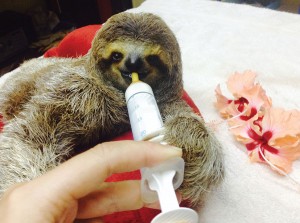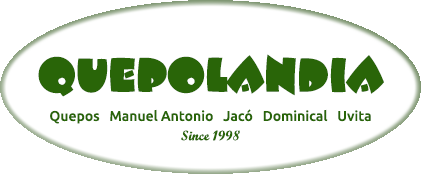Saving the Sloths: KSTR Sloth Rehabilitation and Release Program
 By Mary Elizabeth Wallace, KSTR volunteer
By Mary Elizabeth Wallace, KSTR volunteer
For over the past 14 years Kids Saving the Rainforest has been rehabilitating and rereleasing sloths back into the rainforests of Manuel Antonio. It all started with Buddy, a baby three- toed sloth who was brought to us on News Years Day in 2000 by a young neighbor. Buddy was weaned back to health, taught the important survival skills that his mother would have and was successfully released back into the wild.
In total KSTR has rereleased over 20 three- toed sloths and one two-toed sloth with our Sloth Rehabilitation and Release Program.
Currently in our sloth nursery at the KSTR animal sanctuary we have 4 young orphaned sloths that are being cared for with around the clock attention by our vet tech, Sam Trull. Two-toed and three-toed sloths have one huge difference between them; Two-toed sloths are nocturnal animals, which mean they are active at night and sleep most of the day. Whereas three-toed sloths are diurnal, making them active during the day and sleeping at night. Presently we have both types of sloths at our nursery, which makes their rehabilitation quite a time consuming process.
All of our young sloths came to us as orphans, so a huge role in our rehabilitation program is to teach them the necessary tools their mothers would have to effectively survive in the wild.
Upon arrival we assess the sloth’s current condition. Some of our sloths come in so young, just a few days old and still with their umbilical cord attached. While other injured sloths are adults, which have been electrocuted, hit by a car or attacked by a dog and need medical help and time to recover.
The next step of the rehabilitation process is to get the sloths eating regularly. We feed our baby sloths fresh pasteurized goat milk by a syringe with a nipple attached for them to suck. Mother sloths in the wild teach their young to eat the leaves which they like themselves, so most of our sloths have come to us with a leaf preference already. It is our job to figure out which leaves they like and are willing to eat.
Once our sloths are eating regularly and full of strength we take them out for walks. The sloth walking process is a great way for young sloths to climb around and build the muscles they need to be hanging in trees all day. We start off by putting babies on stuffed animals, so they have something to cling to for comfort. Then we walk around to different trees which we know have safe and edible leaves. We allow the sloths to smell the tree and if they would like, climb up it, explore and eat. After many successful walks we ease the young sloths into an outdoor enclosure where they can forage and explore on their own in a safe environment.
Currently we are raising funds for two sloth related projects with help from Seda Sejud, owner of Villa Perezoso (www.villaperezoso.com). The first is to build what we call Bootcamp; a large outdoor, fenced area where young sloths can feel like they truly are in the rainforest. This would allow the rehabilitated sloths to be properly trained, acclimated and ready for their big release day. The second project is the purchase of GPS collars especially designed to fit sloths, so we can track their movement after being released and have the ability to locate them for observation and research purposes.
The ultimate goal in our Sloth Rehabilitation and Release Program is to get all orphaned babies and mature sloths back and thriving in the wild. With the help our dedicated staff, volunteers and donors we see many fruitful years ahead of KSTR and many healthy sloths back in the rainforest.
Please remember, if you ever see injured wildlife give us a call at 2777-1548. Thank you.

